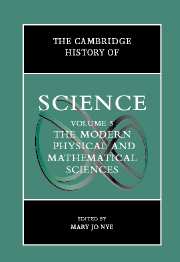Book contents
- Frontmatter
- Introduction: The Modern Physical and Mathematical Sciences
- Part I The Public Cultures of the Physical Sciences After 1800
- Part II Discipline Building in the Sciences: Places, Instruments, Communication
- Part III Chemistry and Physics: Problems Through the Early 1900s
- Part IV Atomic and Molecular Sciences in the Twentieth Century
- Part V Mathematics, Astronomy, and Cosmology Since the Eighteenth Century
- Part VI Problems and Promises at the End of the Twentieth Century
- Index
- References
Introduction: The Modern Physical and Mathematical Sciences
Published online by Cambridge University Press: 28 March 2008
- Frontmatter
- Introduction: The Modern Physical and Mathematical Sciences
- Part I The Public Cultures of the Physical Sciences After 1800
- Part II Discipline Building in the Sciences: Places, Instruments, Communication
- Part III Chemistry and Physics: Problems Through the Early 1900s
- Part IV Atomic and Molecular Sciences in the Twentieth Century
- Part V Mathematics, Astronomy, and Cosmology Since the Eighteenth Century
- Part VI Problems and Promises at the End of the Twentieth Century
- Index
- References
Summary
The modern historical period from the Enlightenment to the mid-twentieth century has often been called an age of science, an age of progress or, using Auguste Comte’s term, an age of positivism.
Volume 5 in The Cambridge History of Science is largely a history of the nineteenth- and twentieth-century period in which mathematicians and scientists optimistically aimed to establish conceptual foundations and empirical knowledge for a rational, rigorous scientific understanding that is accurate, dependable, and universal. These scientists criticized, enlarged, and transformed what they already knew, and they expected their successors to do the same. Most mathematicians and scientists still adhere to these traditional aims and expectations and to the optimism identified with modern science.
By way of contrast, some writers and critics in the late twentieth century characterized the waning years of the twentieth century as a postmodern and postpositivist age. By this they meant, in part, that there is no acceptable master narrative for history as a story of progress and improvement grounded on scientific methods and values. They also meant, in part, that subjectivity and relativism are to be taken seriously both cognitively and culturally, thereby undermining claims for scientific knowledge as dependable and privileged knowledge.
- Type
- Chapter
- Information
- The Cambridge History of Science , pp. 1 - 18Publisher: Cambridge University PressPrint publication year: 2002

